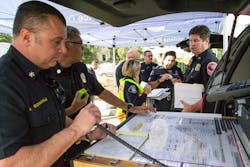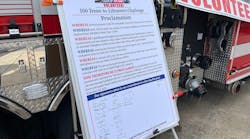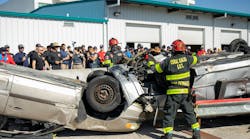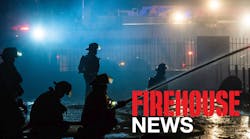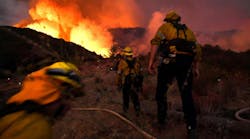An Internet search for fire-related degree programs will give you dozens of options from which to choose. If you are planning to continue your education—and I hope you are, no matter what degree you already may have—I ask you to carefully weigh your options and think about what you want as the end result. Not all degrees are equal, and hopefully you have taken the time to learn the dangers of going to the wrong school.
The right program
If you have not yet done research on accredited versus non-accredited, please do so. I regularly turn away people who come to me with coursework from schools that lack the proper accreditation, and as a regionally accredited university, we simply cannot accept work from schools that do not carry the same level of accreditation. The adage “something is only worth what you pay for it” applies to education as well. Little effort reaps little reward. If you get something for nothing, that is what it is worth. Look for legitimate, accredited degrees that will make you work to become a better person. You will appreciate it in the end.
As you review curricula for potential programs, look for courses that will not only supply you with technical knowledge but also for courses that will make you well rounded in other critical areas. Learning to excel in a couple of key areas will give you an edge on those working for the same promotion. There’s no doubt you are qualified when it comes to handling the hose, swinging the axe or wheeling the rig, but how do you stack up in your “off-the-job” abilities that may one day be a part of your job?
Writing basics
I just completed my 16th year as the director of fire programs at the University of North Carolina at Charlotte. Over those 16 years, I have heard one admonition repeated to me countless times from fire department and private industry representatives: “Please make sure your students can write and speak effectively.” Somewhere in the educational system (a topic left for another day), there has been a falling away from the belief that the ability to spell correctly and construct proper sentences is important. I do not ascribe to that school of thought. I liken a poorly written document to that of a dirty apparatus on the floor. You may walk by a clean and shiny truck and never notice it, but I can promise that you will notice the dirty one sitting in the bay every time. A document that has typos and misspellings will get the same unwanted attention.
The ability to write properly and create readable, coherent technical reports and documents is a skill that can make you stand out from the crowd or, in some instances, keep you from doing just that. A few years ago, an accident report made its way across my desk. The report was from a training incident where a student was injured and required medical attention. As I read the report, I was dumbstruck that someone had actually submitted the document as an “official report.” The report was almost incomprehensible, as it was filled with run-on sentences, misspelled and misused words, and sentence fragments. There was one sentence where the word “that” was used five times and referred to three different objects within the sentence. I had to diagram the sentence to understand what the author was trying to convey. I have known the author of that document for more than 20 years and know him to be a good and competent fire officer. Yet each time I have the opportunity to interact with him, the memories of that horribly written document surface. That poorly written report could potentially follow him through his career and surface at each opportunity for promotion. Even more frightening would be the possible outcomes of the training incident, had it ended in a lawsuit. Can you imagine getting on the stand to defend your actions with a poorly written report as your only supporting evidence? Court cases are often won, lost or dismissed on technicalities in documents. A lawyer could make your life miserable when you have documents with unclear meanings as your support.
Will a college degree make you an expert writer? No, it will not make you an expert, but it can certainly move you in the right direction. Being required to submit papers and getting feedback from your professors on a regular basis will help. You will start to identify your areas of weakness, and you can begin to address those. Additionally, most colleges and universities will have some type of writing resource center where you can submit examples of your writing, and they can provide feedback to you to improve your writing. Good writing is a skill that eludes many. Take the opportunity to become a better writer, and it will reward you later.
Communication skills
Oral communication is also a critical skill that you can improve while working on your degree. Almost every major course in our curriculum includes an oral presentation component. While the students often grumble about having to speak in front of their classmates so frequently, it benefits them, and most do not even realize it at the time. However, each time they get up and do a presentation, they get a little more relaxed. A testament to the success of this practice came in the form of a comment from a deputy chief at a large metropolitan fire department that hires a lot of our graduates. In a conversation, the deputy chief mentioned that he could pick the students from our program out of interviews and assessment centers because of their ability speak and handle themselves well in those situations.
Math matters
Almost universally, firefighters seem to have an aversion to math. I count myself as one of those, too. However, this is an area where you can set yourself apart from your peers.
A solid working knowledge of basic mathematics will also be a tool that many do not have in their proverbial toolbox. I’m not talking about being able to add short columns of small numbers. I am talking about the ability to do basic algebra and have a working knowledge of statistics.
The primary reason you should have some math skills is to help you make informed decisions. For example, how do you know that the brand of tires or turnout gear (or whatever that you are buying) from a low bid is, in reality, the most prudent choice financially? The ability to do life-cycle cost analysis may help you determine that, in the long run, the more expensive option on the front end is a actually a money-saver over time. I had a student who was able to change his department’s apparatus purchase schedule by doing some fairly basic analyses of apparatus maintenance records. The work that the student completed demonstrated that the department (and thus, the city) spent more on maintenance during the last two to three years of the service life of an apparatus than the cost of the payments on new apparatus. Some basic math skills and an ability to communicate the findings both effectively and persuasively meant the rolling stock for that department could be replaced sooner and the budget was healthier.
In another instance, a student completed a study of the feasibility of putting paramedics on his department. The student first gathered data on all calls over a period of years. From those calls, data were collected on how many were medical calls that required some level of medical treatment. From that data, additional information was gathered, such as how long it took EMS to arrive on scene, how many of the medical calls required paramedic level interventions, average times for those intervention skills to be applied, and transport time to the hospital from the scene. From an analysis of the data collected, the student could demonstrate that in a high percentage of the calls, the fire department arrived on scene with a sufficiently long enough time interval before EMS that the firefighters could implement paramedic level skills. This change very likely increased the likelihood for patient survival. Being able to make those kind of determinations and discoveries gets you noticed at promotion time.
In sum
The purpose of an education is to make you a better person. If you are seeking a degree because you want to check an item off a list, then this advice probably doesn’t apply to you. If you desire to be the best you can be, both on your job and in other aspects of your life, then a proper education is one piece of that plan. A good degree will open doors for you that you don’t even know exist. Choose wisely.
